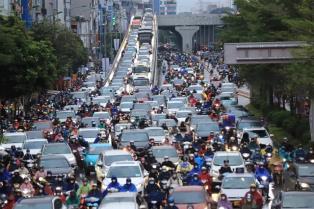For visitors to Viet Nam, one of the most striking images is that of the bustling roads, with a huge number of motorbikes battling for space with cars, trucks and public transport.

For visitors to Viet Nam, one of the most striking images is that of the bustling roads, with a huge number of motorbikes battling for space with cars, trucks and public transport.
Iconic as it may be, this seemingly chaotic traffic scene comes with a high environmental cost. Not only in Viet Nam, but all across Asia cities are suffocating under a blanket of smog, caused in part by the increasing use of combustion engines.
In response, and taking into account a growing awareness of environmental issues, a number of companies are entering the fray with electric vehicles (EVs). Already popular in the US with the likes of Tesla, the trend is spreading East.
The biggest name so far is Vinfast, which has produced and brought to market a number of modern electric scooters.
On March 28, VinFast opened 64 new electric motorcycle showrooms combining the Vin3s experience centres in 30 cities and provinces, an article on its official website showed. It aims to synchronously deploy the system of 450 showrooms combining the Vin3S experience centres this year.
One start-up that sees potential among Viet Nam’s around 50 million motorcycles is Dat Bike. Rather than upending tradition, founder and CEO of DAT BIKE Nguyen Ba Canh Son is updating it, and he has big ambitions.
“Since I was in high school, EVs in Viet Nam have mostly been for students. At the moment, EVs are produced to replace bicycles for students, not gasoline engine motorbikes for adults,” Son said.
“Dat Bike was founded to meet the demands of the market. I wish to replace all gasoline engine vehicles in Viet Nam and Southeast Asia with EVs.”
According to Son, the market for two-wheeled motorbikes is worth up to US$8 billion a year, with around 85 million people, including the driver and a person who sits behind, using them every day. Each year, 3.5 million motorbikes are sold, but under 3 per cent are EVs. Similarly, across the region, the market is worth up to US$25 billion, with around 250 million consumers, but again a paltry 2 per cent are EVs.
One of the stumbling blocks in the mass adoption of EVs, especially in Viet Nam, is the belief they lack the performance of their combustion-based counterparts.
“At present, all EVs in the market don’t meet the requirements in performance, such as travelled distance and speed, which is 2 – 3 times lower compared to gasoline engine motorbikes. So, Dat Bike focuses on creating EVs with strong performance which can travel a long distance at high speed to replace gasoline engine motorbikes.”
Dat Bike is the first made-in-Viet Nam electric motorbike to close that performance gap.
Its flagship model, called Weaver, was created to serve that purpose and also to push up the environmental credentials of the country’s vehicles. In contrast to lead batteries, Weaver’s lithium-ion batteries, which can be fully charged at a standard electric outlet in three hours and have a long service life, are non-toxic and can be disposed in landfills, but users can sell used batteries to recycling facilities as up to 80 per cent of our batteries can be recycled.
Founded in 2018, the start-up of the 31-year-old man, who has spent more than 10 years working in software development sectors, has successfully raised funds twice. In 2019, Dat Bike signed a deal to sell a 2 per cent stake for US$60,000. Two years later, the company once again succeeded in raising US$2.6 million in pre-Series A funding led by Jungle Ventures.
The young CEO believes that his strong determination and big ambition are behind the company’s success.
“We are really serious about our work,” Son said, speaking about his whole team.
“Secondly, we must have big ambition and clear vision about what we want to do, like if the cake is big, other people will want to jump in and take a piece.”
“For example, if I just want to make bikes for tourists in Da Nang, not many investors would like to invest in us. Therefore, we have to show investors our clear targets.”
“Since I came back to Viet Nam, I have wanted to replace all gasoline engine motorbikes with EVs. I think this ambition is big enough to draw investors’ attention.”
Dat Bike and Nguyen Ba Canh Son clearly have big ambitions for the future of Viet Nam’s roads. With mounting pressure on companies and governments around the world to tackle environmental impacts and emissions, the EV sector is one to watch.
Dat Bike’s initial success could spur others to join the market, and soon make Viet Nam’s overcrowded transport system cleaner and greener. — VNS





